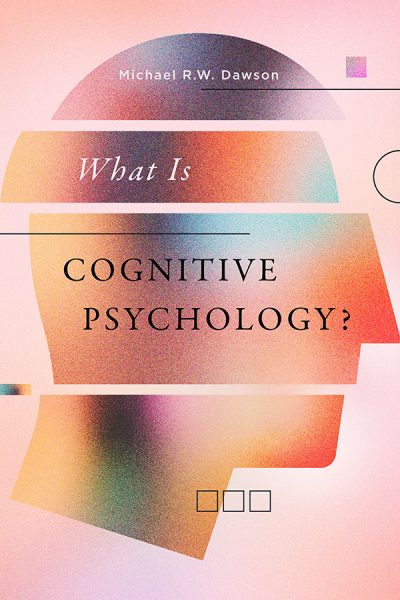What Is Cognitive Psychology? identifies the theoretical foundations of cognitive psychology—foundations which have received very little attention in modern textbooks. Beginning with the basics of information processing, Michael R. W. Dawson explores what experimental psychologists infer about these processes and considers what scientific explanations are required when we assume cognition is rule-governed symbol manipulation. From these foundations, psychologists can identify the architecture of cognition and better understand its role in debates about its true nature. This volume offers a deeper understanding of cognitive psychology and presents ideas for integrating traditional cognitive psychology with more modern fields like cognitive neuroscience.
What Is Cognitive Psychology? fills a unique gap in the field of cognitive psychology. Firmly grounded in the fundamentals and historical foundations of cognitive science, students will find this extremely readable book an invaluable aid and resource.”
Alan Kingstone, University of British Columbia
About the Author
Michael R. W. Dawson is professor of psychology at the University of Alberta and the author of From Bricks to Brains: The Embodied Cognitive Science of LEGO Robots (2010), Mind, Body, World: Foundations of Cognitive Science (2013), and Connectionist Representations of Tonal Music (2018).
Table of Contents
- Acknowledgements
- Introduction
- Chapter 1: What Is Information Processing?
- 1.1 Formal Games
- 1.2 Form and Function
- 1.3 The Formalist’s Motto
- 1.4 Demonstrating the Formalist’s Motto
- 1.5 A Universal Machine
- 1.6 Why Is the Turing Machine Important?
- 1.7 The Modern Computer
- 1.8 Explaining How Computers Process Information
- 1.9 A Hierarchy of Levels
- 1.10 Explaining Human Cognition
- 1.11 Chapter Summary
- Chapter 2: Inferring Cognitive Processes
- 2.1 Using Symbols
- 2.2 Partial Report and Iconic Memory
- 2.3 Primary Memory and Acoustic Confusions
- 2.4 Delaying Recall from Primary Memory
- 2.5 Primary Memory and Recoding
- 2.6 Example: Recoding Digits into Chunks
- 2.7 Functional Dissociations of Serial Position Curves
- 2.8 Rehearsal and the Primacy Effect
- 2.9 Sentence Verification and Secondary Memory
- 2.10 Associations, Verbal Learning, and Secondary Memory
- 2.11 Imagery and Secondary Memory
- 2.12 Inferring Structure, Process, and Control
- 2.13 How to Remember π to 100 Digits
- 2.14 Chapter Summary
- Chapter 3: Using Functional Analysis to Explain Cognition
- 3.1 Competing Notions of Explanation
- 3.2 Functionalism, Hierarchies, and Functional Decomposition
- 3.3 Ryle’s Regress
- 3.4 Functional Analysis
- 3.5 The Architecture of Cognition
- 3.6 Functional Analysis of Colour Perception
- 3.7 The Cognitive Approach
- 3.8 Seeking Strong Equivalence
- 3.9 Relative Complexity Evidence
- 3.10 Error Evidence
- 3.11 Intermediate State Evidence
- 3.12 The Cognitive Impenetrability Criterion
- 3.13 Cognitive Psychology in Principle and in Practice
- 3.14 Chapter Summary
- Chapter 4: Cognitive Architectures
- 4.1 The Variety of Cognitive Psychology
- 4.2 Serial and Parallel Processing
- 4.3 Data-Driven and Theory-Driven Processing
- 4.4 Automatic and Controlled Processing
- 4.5 Structures and Processes
- 4.6 Structure, Process, and Control
- 4.7 Nativism and Empiricism
- 4.8 Isotropic and Modular Processing
- 4.9 An Example Architecture
- 4.10 Chapter Summary
- Chapter 5: Questioning Foundations
- 5.1 Questioning Foundational Assumptions
- 5.2 Do We Need the Computer Metaphor?
- 5.3 Does Cognition Require Rules?
- 5.4 Can Connectionist Networks Provide Cognitive Theories?
- 5.5 Do People Think?
- 5.6 Where Is the Mind?
- 5.7 Can Machines Think?
- 5.8 What Is the “Cognitive” in Cognitive Neuroscience?
- 5.9 Do Brains Think?
- 5.10 Which Topics Are Important to Cognitive Psychology?
- 5.11 What Is Cognitive Psychology?
- References
This work is licensed under a Creative Commons License (CC BY-NC-ND 4.0). It may be reproduced for non-commercial purposes, provided that the original author is credited.
